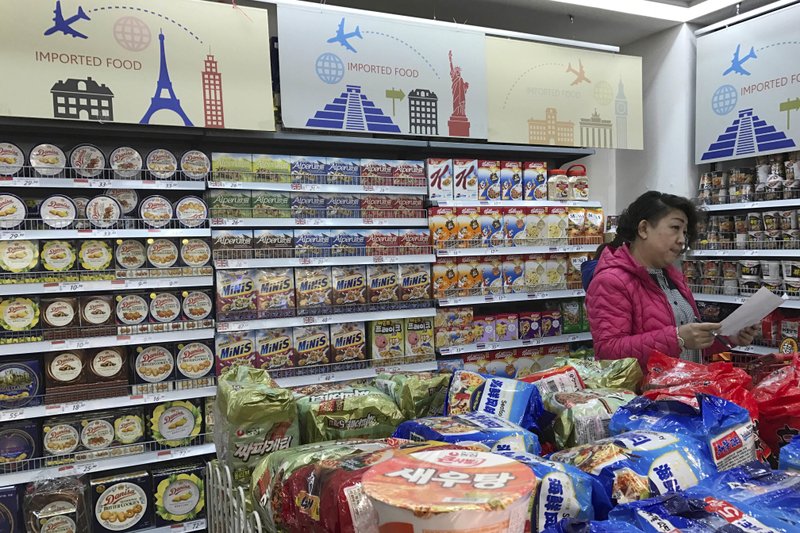BEIJING -- The top U.N. food-standards official will visit Beijing next month in a last-ditch attempt to persuade China to scale back a plan requiring intensive inspections of food imports. The plan threatens to disrupt billions of dollars in commerce, trade officials in Washington and Europe say.
China's plan would complicate trade and increase tension with the administration of U.S. President Donald Trump, who has promised to raise tariffs on imports from China, analysts said.
Under the new rule, set to take effect as early as October, each consignment of food -- including low-risk items such as chocolate and wine -- would require a certificate from a foreign inspector confirming it meets Chinese quality standards. Other countries require such inspections only for meat, dairy and other perishable items.
Many suppliers see China as a growing market for American fruit juice and snack foods, French wine, German chocolate, Italian pasta and Australian orange juice. They complain China already uses safety rules in ways that hamper access for beef and other goods in violation of its market-opening commitments.
"It could bring down food imports quite dramatically," said the German ambassador to China, Michael Clauss. "It often seems it is more about protecting Chinese producers than about food safety."
In the past, China has banned all poultry imports from the U.S. after regional outbreaks of pathogenic avian influenza. China has also temporarily banned all U.S. beef imports over concerns about the spread of mad cow disease. Trade officials have been working for years to develop a protocol for the export of Arkansas rice to China, the biggest producer and importer of rice.
The new Chinese rule would add "unnecessary regulatory complexity" at a time when China has promised to reduce regulation, Jake Parker, vice president of China operations for the U.S.-China Business Council, said in an email.
Chinese regulators say closer scrutiny is needed as food imports increase. They say they are willing to consider suggestions about alternatives, but foreign officials say they have yet to make any changes.
China contends the inspections requirement is supported by the Codex Alimentarius, the "Food Code" of the U.N. Food and Agriculture Organization and World Health Organization, according to a person familiar with the discussions. The Codex sets quality standards, but other nations say it recommends certificates only for risky products.
The president of the Codex council, Awilo Ochieng Pernet, a Swiss lawyer, will attend an April 6 seminar with Chinese officials in Beijing to explain its standards, according to that person, who asked not to be identified further. Participants plan to propose alternatives such as giving China access to electronic records to track sources of shipments.
Ambassadors from the United States and another government expressed concern in a letter in January to Wang Yang, a deputy premier who oversees farming and commerce.
Officials of the United States, the EU, Canada, New Zealand, Australia, Argentina, Chile and other governments sent a similar letter to the Chinese product quality agency, the General Administration for Quality Inspection, Supervision and Quarantine.
EU officials believe that requiring health certificates for all products "is not scientifically justified," the EU mission in Beijing said in a statement.
The rules would be a burden on foreign suppliers and "a waste of the precious control resources" that should focus on risky products, it said.
The rules follow an avalanche of scandals over Chinese suppliers caught selling tainted milk and other shoddy or counterfeit food products.
Western officials say the proposed food rules appear meant to shift responsibility away from the Chinese product quality agency, which Chinese consumers often blame for safety failures.
In a written statement, the Chinese product quality agency told The Associated Press it is talking with more than 30 exporting countries and regions including the European Union, the United States, Canada, Australia, New Zealand and Japan. The agency said it welcomes suggestions of "alternative solutions."
Potentially complicating the global trade situation, finance ministers and central bankers from the Group of 20 major economies dropped a pledge to eschew protectionism in a statement Saturday. The move came after pressure from the U.S.
Trump has accused China of unfair trade practices and currency manipulation, and he pledged as a candidate to address both issues if elected. U.S. Commerce Secretary Wilbur Ross said in a Bloomberg Television interview on March 1 that measures will be announced "as soon as we have a proper case prepared."
The administration's rhetoric has softened since the campaign, with one of Trump's top economic advisers, Steve Schwarzman, saying the president will likely temper his criticisms of China.
An import tax of 45 percent, the top end of Trump's campaign proposal, could trigger an 87 percent decline in Chinese exports to American consumers, Kevin Lai, the Hong Kong-based chief economist for Asia at Daiwa Capital Markets, estimated during the campaign.
China could retaliate with its own tariffs on American products such as Boeing airplanes, iPhones and soybeans. U.S. businesses in China also could face tax or antitrust investigations.
"There's too much at stake for both countries to engage in a trade war," said Eddy Li, president of the 3,000-member Chinese Manufacturers' Association of Hong Kong. "Although we are concerned about such a scenario, we also feel optimistic."
Clauss, the German ambassador, said China's food import rules should be submitted for WTO review -- a step that the Chinese product quality agency said in its written statement it will take.
"We don't see that they really are trying to compromise on this so far," Clauss said. "To our knowledge, this doesn't exist anywhere else in the world."
Information for this article was contributed by Joe McDonald, Gillian Wong and Marley Jay of The Associated Press and by Jing Yang de Morel, Miao Han, Matt Townsend and Haze Fan of Bloomberg News.
A Section on 03/21/2017
